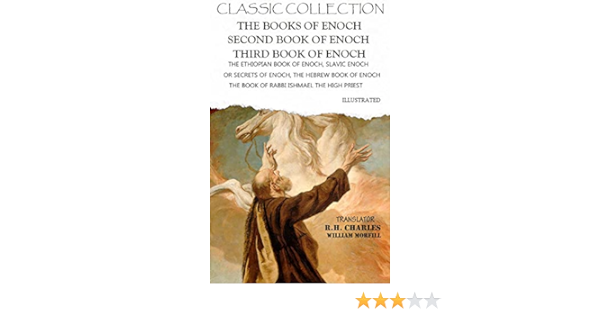The Second book of enoch, also known as the Slavonic Enoch, is a text that has intrigued and fascinated scholars and spiritual seekers for centuries. This book, along with its counterpart the First Book of Enoch, forms part of the wider tradition of Enochian literature which explores the life and teachings of the biblical figure Enoch, who was said to have been taken up to heaven and shown visions of the end times.
While the First Book of Enoch focuses primarily on apocalyptic visions and warnings, the Second Book delves deeper into the mysteries of the cosmos, the nature of angels, and the secrets of divine creation. Although considered apocryphal by mainstream Christian traditions, the Second Book of Enoch continues to hold a significant place in the study of early Christian history and theology. In this article, we will take a closer look at the origins, contents, and controversies surrounding this enigmatic text.
Unveiling the Secrets: Exploring the Contents of the Second Book of Enoch

The Second Book of Enoch, like many other ancient texts, has gone through various translations and versions over time. As a result, the exact contents of the book may vary depending on the version being studied. Despite these differences, there are certain themes and topics that remain consistent throughout the different versions of the text.
The Creation Story and the Fall of Angels
One of the main themes explored in the Second Book of Enoch is the creation story and the fall of angels. Similar to the biblical account in the book of Genesis, the Second Book of Enoch describes God’s creation of the world and humankind. However, it also delves into the creation of the angels and the role they played in the events leading up to the fall of humanity.
According to the Second Book, God created the angels before the world and gave them specific duties and responsibilities. However, some of these angels, led by a group known as the Watchers, became enamored with human women and lusted after them. They then descended to earth, defying God’s will, and taught humans forbidden knowledge and arts such as magic and divination.
The Mysteries of Heaven and Earth
The Second Book of Enoch also contains extensive descriptions and visions of the mysteries of heaven and earth. In this text, Enoch is taken on a journey through the different levels of heaven, where he encounters various beings and witnesses the workings of the universe. He is also shown the punishments that await the fallen angels and the wicked on Judgment Day.
Aside from heavenly visions, the Second Book also delves into the mysteries of the earth, describing various geographical locations, natural phenomena, and even the origins of different races and languages. These passages provide a unique insight into the early Christian understanding of cosmology and the interconnectedness of the spiritual and physical realms.
The Role of Enoch as a Messenger
In both the First and Second Books of Enoch, Enoch is portrayed as a messenger appointed by God to deliver important revelations and warnings to humanity. However, in the Second Book, Enoch’s role is expanded, and he becomes a more prominent figure in the narrative. He is not only a messenger but also a teacher and guide, leading his listeners towards divine wisdom and understanding.
Origins and Authorship: Tracing the Roots of the Second Book of Enoch

The origins of the Second Book of Enoch remain shrouded in mystery, adding to its enigmatic appeal. It is believed to have been composed sometime between the 1st and 3rd centuries CE, making it a relatively early Christian text. However, there is no consensus among scholars regarding its exact dating or authorship.
Some scholars argue that the Second Book of Enoch was written by the same author(s) as the First Book, while others believe it was authored by a different group within the Enochian tradition. Additionally, there is evidence that the Second Book may have undergone multiple redactions and additions over time, further complicating its origins.
The earliest surviving manuscripts of the Second Book of Enoch were found among the texts in the Dead Sea Scrolls, dating back to around the 1st century BCE. However, these manuscripts only contain fragments of the text, making it difficult to determine the original content and structure of the book.
Theological Significance: Exploring the Book’s Impact on Early Christian Beliefs

The Second Book of Enoch, along with other apocryphal texts, played a significant role in shaping early Christian beliefs and practices. It provided a unique perspective on creation, the fall of angels, and the role of prophets and messengers in delivering divine revelations. These ideas influenced the development of Christian theology, particularly in areas related to cosmology and angelology.
One of the most notable theological contributions of the Second Book of Enoch was its influence on the concept of the Messianic Age. This idea, which originated in Jewish apocalyptic literature, describes a future period of peace and harmony on earth, brought about by the coming of a Messiah figure. The Second Book of Enoch contributed to this concept by depicting Enoch as a messianic figure who would eventually return to earth to usher in this new age.
Interpretations and Controversies: Examining the Diverse Perspectives on the Second Book of Enoch

As with any ancient text, the Second Book of Enoch has been subject to various interpretations and debates among scholars and theologians. One of the main points of contention is its inclusion in the canon of scripture, with some Christian denominations accepting it as authoritative and others rejecting it as apocryphal.
The role of the fallen angels, and in particular, the Watchers, has also been a source of controversy. Some see them as mere tempters or corrupters of humankind, while others view them as divine beings who played a necessary role in human evolution. This has led to different interpretations of the book’s message and its relationship to mainstream Christian beliefs.
The Enduring Legacy: The Second Book of Enoch’s Influence on Literature and History

Despite its apocryphal status, the Second Book of Enoch has left a lasting impact on literature and history. It has been referenced and alluded to in various works, from medieval religious texts to modern popular culture. Its themes and ideas have also influenced the development of other religious and spiritual movements, such as Gnosticism and Kabbalah.
Moreover, the Second Book of Enoch provides valuable insights into the early Christian beliefs and practices, shedding light on the diversity and complexity of the religion during its formative years. It serves as a testament to the enduring influence of biblical figures such as Enoch, and their continued relevance in shaping the religious landscape of today.
Conclusion
In conclusion, the Second Book of Enoch stands as a captivating and enigmatic text within the broader tradition of Enochian literature. Its exploration of the mysteries of heaven and earth, along with its unique theological contributions, continue to fascinate scholars, theologians, and spiritual seekers alike. Despite its controversial origins and interpretations, the Second Book of Enoch is a valuable piece of early Christian history and remains a testament to the enduring power of ancient texts to shape our understanding of the world and our place in it.
